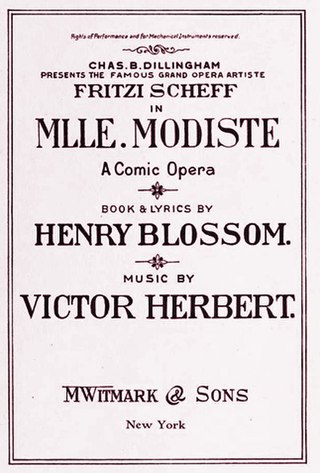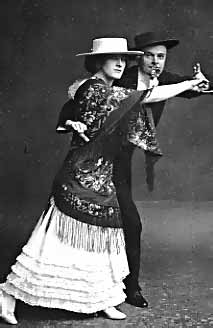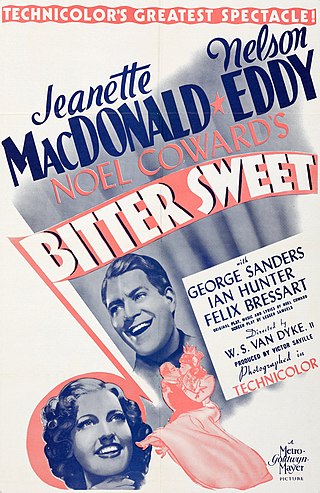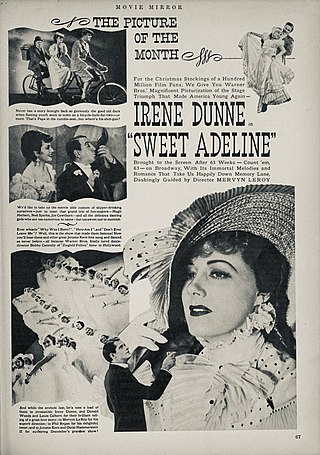Related Research Articles

Footlight Parade is a 1933 American pre-Code musical film starring James Cagney, Joan Blondell, Ruby Keeler and Dick Powell and featuring Frank McHugh, Guy Kibbee, Hugh Herbert and Ruth Donnelly. The film was written by Manuel Seff and James Seymour based on a story by Robert Lord and Peter Milne, and was directed by Lloyd Bacon, with musical numbers created and directed by Busby Berkeley. The film's songs were written by Harry Warren (music), Al Dubin (lyrics), Sammy Fain (music) and Irving Kahal (lyrics), and include "By a Waterfall", "Honeymoon Hotel" and "Shanghai Lil".

Bitter Sweet is an operetta in three acts, with book, music and lyrics by Noël Coward. The story, set in 19th century and early 20th century England and Austria-Hungary, centres on a young woman's elopement with her music teacher. The songs from the score include "The Call of Life", "If You Could Only Come with Me", "I'll See You Again", "Dear Little Café", "If Love Were All", "Ladies of the Town", "Tokay", "Zigeuner" and "Green Carnation".

Harry Bache Smith was a writer, lyricist and composer. The most prolific of all American stage writers, he is said to have written over 300 librettos and more than 6000 lyrics. Some of his best-known works were librettos for the composers Victor Herbert and Reginald De Koven. He also wrote the book or lyrics for several versions of the Ziegfeld Follies.

Mlle. Modiste is an operetta in two acts composed by Victor Herbert with a libretto by Henry Blossom. It concerns hat shop girl Fifi, who longs to be an opera singer, but who is such a good hat seller that her employer, Mme. Cecil, discourages her in her ambitions and exploits her commercial talents. Also, Fifi loves Etienne de Bouvray, who returns her love, but his uncle, Count Henri, opposes their union. The operetta features the song "Kiss Me Again".

Maytime is a 1937 American musical and romantic-drama film produced by MGM. It was directed by Robert Z. Leonard, and stars Jeanette MacDonald and Nelson Eddy. The screenplay was rewritten from the book for Sigmund Romberg's 1917 operetta Maytime by Rida Johnson Young, Romberg's librettist; however, only one musical number by Romberg was retained.

Dorothy is a comic opera in three acts with music by Alfred Cellier and a libretto by B. C. Stephenson. The story involves a rake who falls in love with his disguised fiancée.

The Catch of the Season is an Edwardian musical comedy by Seymour Hicks and Cosmo Hamilton, with music by Herbert Haines and Evelyn Baker and lyrics by Charles H. Taylor, based on the fairy tale Cinderella. A debutante is engaged to a young aristocrat but loves a page.

The Beauty of Bath is a musical comedy with a book by Seymour Hicks and Cosmo Hamilton, lyrics by C. H. Taylor and music by Herbert Haines; additional songs were provided by Jerome Kern, F. Clifford Harris (lyrics) and P. G. Wodehouse (lyrics). Based loosely on the play David Garrick, the story concerns a young woman from a noble family, who falls in love with an actor. She then meets a sailor who appears identical to the actor and mistakes him for the latter. Her father objects to a marriage with the actor, but when it turns out that she really loves the sailor, all objections fall away.

The Sunshine Girl is an Edwardian musical comedy in two acts with a book by Paul A. Rubens and Cecil Raleigh, lyrics and music by Rubens and additional lyrics by Arthur Wimperis. The story involves a working girl who falls in love with the heir to the factory. He is in disguise and wants to be loved for himself, not his position, so he gets his friend to pose as the heir, leading to complications for both men.
Henry Martyn Blossom, Jr. was an American writer, playwright, novelist, opera librettist, and lyricist. He first gained wide attention for his second novel, Checkers: A Hard Luck Story (1896), which was successfully adapted by Blossom into a 1903 Broadway play, Checkers. It was Blossom's first stage work and his first critical success in the theatre. The play in turn was adapted by others creatives into two silent films, one in 1913 and the other in 1919, and the play was the basis for the 1920 Broadway musical Honey Girl. Checkers was soon followed by Blossom's first critical success as a lyricist, the comic opera The Yankee Consul (1903), on which he collaborated with fellow Saint Louis resident and composer Alfred G. Robyn. This work was also adapted into a silent film in 1921. He later collaborated with Robyn again; writing the book and lyrics for their 1912 musical All for the Ladies.

The Wizard of the Nile is a comic opera in three acts with music by composer Victor Herbert and a libretto by Harry B. Smith. This was Herbert's second comic opera after Prince Ananias, and was his first real success.
The Laurence Olivier Award for Best Actress in a Musical is an annual award presented by the Society of London Theatre in recognition of achievements in commercial London theatre. The awards were established as the Society of West End Theatre Awards in 1976, and renamed in 1984 in honour of English actor and director Laurence Olivier.

The Girl from Utah is an Edwardian musical comedy in two acts with music by Paul Rubens, and Sidney Jones, a book by James T. Tanner, and lyrics by Adrian Ross, Percy Greenbank and Rubens. The story concerns an American girl who runs away to London to avoid becoming a wealthy Mormon's newest wife. The Mormon follows her to England, but she is rescued from a bigamous marriage by a handsome actor.

Bitter Sweet is a 1940 American Technicolor musical film directed by W. S. Van Dyke, based on the operetta Bitter Sweet by Noël Coward. It was nominated for two Academy Awards, one for Best Cinematography and the other for Best Art Direction by Cedric Gibbons and John S. Detlie.

The Duchess of Dantzic is a comic opera in three acts, set in Paris, with music by Ivan Caryll and a book and lyrics by Henry Hamilton, based on the play Madame Sans-Gêne by Victorien Sardou and Émile Moreau. Additional lyrics by Adrian Ross. The story concerns Napoleon I and a laundress, Catherine Üpscher, who marries Marshal Lefebvre and becomes a Duchess.
Bitter Sweet is a British musical romance film directed by Herbert Wilcox and released by United Artists in 1933. It was the first film adaptation of Noël Coward's 1929 operetta Bitter Sweet. It starred Anna Neagle and Fernand Gravey, with Ivy St. Helier reviving her stage role as Manon. It was made at British and Dominion's Elstree Studios and was part of a boom in operetta films during the 1930s.

Dorothy Minto was a prominent actress on the London stage between 1905 and the mid-1930s, notably appearing in the first runs of several plays written by George Bernard Shaw. She also featured in a small number of films between 1916 and 1936. While her early stage career concentrated on classical plays and serious new work, from 1912 onwards she devoted herself more to musicals and comedies.

Leave It to Jane is a musical in two acts, with music by Jerome Kern and book and lyrics by Guy Bolton and P. G. Wodehouse, based on the 1904 play The College Widow, by George Ade. The story concerns the football rivalry between Atwater College and Bingham College, and satirizes college life in a Midwestern U.S. town. A star halfback, Billy, forsakes his father's alma mater, Bingham, to play at Atwater, to be near the seductive Jane, the daughter of Atwater's president.

Oh, My Dear! was a Broadway musical comedy in two acts with book and lyrics by Guy Bolton and P. G. Wodehouse, and music by Louis A. Hirsch. The play was produced by William Elliott and F. Ray Comstock and opened under the direction of Robert Milton and Edward Royce at the Princess Theatre on West 39th Street in New York City on November 27, 1918. Oh, My Dear! had a run of 189 performances, with the final curtain falling on May 10, 1919. The musical takes place at Dr. Rockett's Health Farm in the state of New York.

Sweet Adeline is a 1934 musical film adaptation of the 1929 Jerome Kern/Oscar Hammerstein II Broadway play of the same title. It stars Irene Dunne and Donald Woods and was directed by Mervyn LeRoy.
References
- 1 2 "Victor (August) Herbert". The Guide to Light Opera and Operetta. The Guide to Light Opera and Operetta. Retrieved 18 February 2011.
- ↑ "Miss Dolly Dollars Makes Her Bow", The New York Times, August 31, 1905, p. 7, accessed March 3, 2011
- ↑ "Miss Dolly Dollars; A New Musical Comedy by Victor Herbert and Harry B. Smith", The New York Times, September 5, 1905, accessed March 3, 2011
- ↑ MISS DOLLY DOLLARS Archived 2012-03-14 at the Wayback Machine Cast of Characters